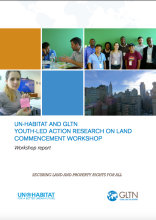Land Library
Welcome to the Land Portal Library. Explore our vast collection of open-access resources (over 74,000) including reports, journal articles, research papers, peer-reviewed publications, legal documents, videos and much more.
/ library resources
Showing items 1 through 9 of 22.The Social Tenure Domain Model offers practical solutions and opportunities for land professionals, researchers, grassroots organisations and government authorities.
The challenge of capacity development is one of the most difficult areas for individuals and institutions working to improve the livelihoods and security of the world’s poorest people.
The land challenge is central to the broader youth dynamics of migration, employment, livelihoods and belonging. The more than 1.8 billion youth living worldwide represent not only a land challenge, but an untapped potential in moving the tenure security agenda forward.
This guide outlines the factors that influence the set up and effective operation of a non-state actor mechanism in the land sector, particularly during a land reform process.
This study aims to examine current land access and youth livelihood opportunities in Southern Ethiopia. We used survey data from the relatively land abundant districts of Oromia Region and from the land scarce districts of Southern Nations, Nationalities and Peoples' (SNNP) Region.
In this synthesis report, the issue of tenure security is addressed and assessed in several countries where government, civil society, the private sector and development cooperation initiatives have been implemented for decades.
The Mexican Forest Code establishes structural reference values to differentiate between secondary and old-growth forests and requires a management plan when secondary forests become old-growth and potentially harvestable forests.
REDD+ has been proposed as a viable option for addressing climate change in the near term, and at relatively low cost.
Implementation of forest restoration projects requires cross-scale and hybrid forms of governance involving the state, the market, civil society, individuals, communities, and other actors.






